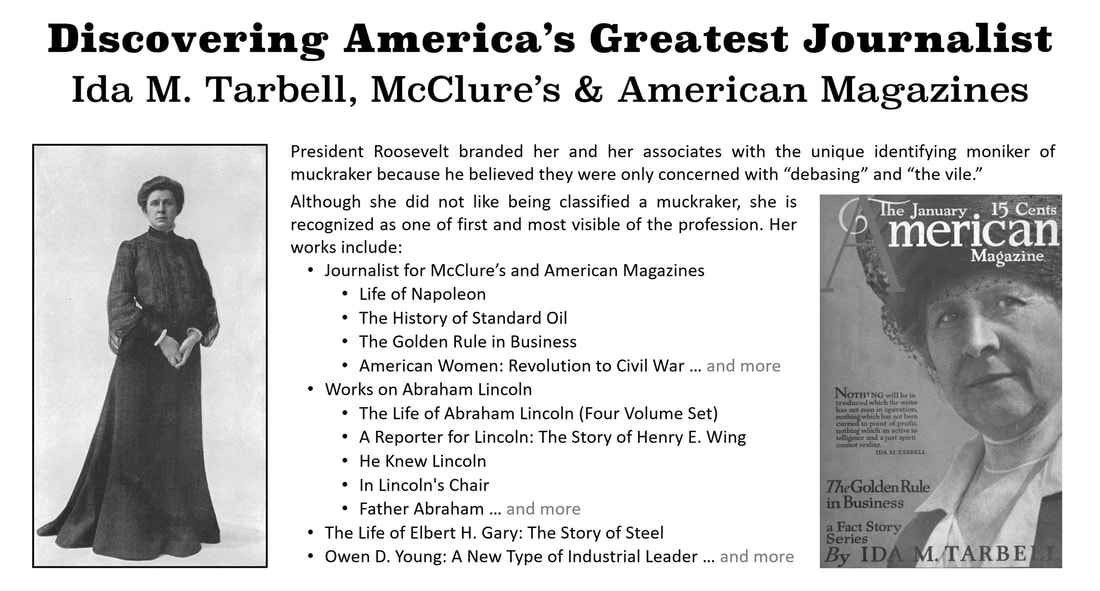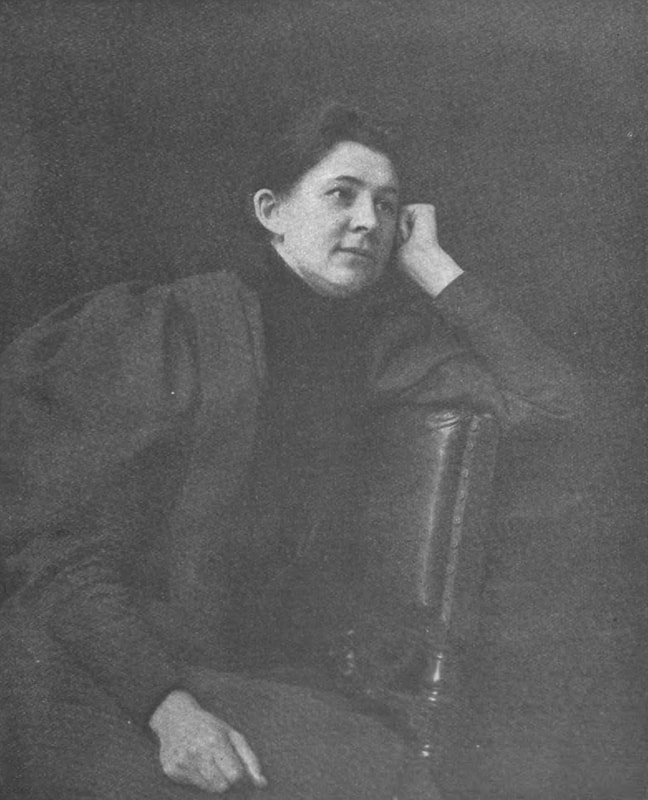Ida M. Tarbell: Discovering America's Greatest Journalist
- Introduction, Overview and Autobiography
- Lincoln Centennial Speech
- Reviews of Lincoln Publications
- Reviews of Corporate Publications
- A Review of One Work of Fiction
- Reviews of Other Works
A Short Introduction to Miss Tarbell
|
Ida was a hard woman. She focused her mind on the integrity of facts, and in her writings, preserved for posterity what her disciplined and inquisitive intellect discovered. She applied the accountability of facts to what and about whom she wrote. Not only did John D. Rockefeller Sr. feel her pen's pointed analysis but the leadership of the suffragettes. She never disagreed with or sought to hinder the suffragette's long-term objective, but she found their tactics quite disagreeable: she openly challenged the movement’s leaders who painted women as victims with men as their eternal oppressors.
To her, the human spirit was the backbone of democracy. To implement a law without a long-term change of heart was promoting a change without a solid foundation because laws can never fully light a righteous path. |
Even the most just of laws are sadly ineffective in the hands of an individual with a pathetic, unethical compass.
To read a more detailed overview choose, "Overview, Introduction and Autobiography" below.
To read a more detailed overview choose, "Overview, Introduction and Autobiography" below.
|
Overview, Introduction and Autobiography |
|
In my on-going research of Thomas J. Watson Sr., traditional founder of IBM, I found an exchange of letters between him and Miss Tarbell.
|
She was inquiring about the percentage of women that were employed at IBM. Watson Sr. replied promptly with all the latest statistics that would make one think that the information was stored in an Excel spreadsheet awaiting her inquiry rather than a mechanical tabulating machine that would have required feeding punch cards to sort, consolidate and then print.
That led me to ask, "Who is Ida M. Tarbell?"
That led me to ask, "Who is Ida M. Tarbell?"
|
Lincoln Centennial Speech |
|
This speech was given on the Centennial Celebration of Lincolns' birth at the University of Michigan. Its message: You can be a Lincoln!
|
"Fancy is so much dearer to us – and easier for us than reason – that we gradually elevate our hero out of our own ranks until we have him seated in Olympus or Valhalla, according as our learnings are Greek or Teutonic. ...
"I contend that as far as Abraham Lincoln is concerned he is eminently more valuable to this people if understood, and studied as a man like the rest of us. A man of high qualities, no doubt, but of qualities common in some degree to all of us."
"I contend that as far as Abraham Lincoln is concerned he is eminently more valuable to this people if understood, and studied as a man like the rest of us. A man of high qualities, no doubt, but of qualities common in some degree to all of us."
Ida M. Tarbell, Lincoln's Centennial Birthday Speech
|
Reviews of Lincoln Publications |
|
Ida M. Tarbell wrote more articles and published more books on Abraham Lincoln than any other writer, and each is a precious gem.
|
I had often wondered why Ida wrote so much on Lincoln. Then, while reading Ray Stannard Baker's autobiography I found the reason: "She [Miss Tarbell] had written a life of Lincoln which we had published in our magazine, and whenever the world looked black she would write a little article or story about him. One, I remember, was called 'He Knew Lincoln.' Lincoln fortified her spirit with his greatness and his humility."
One of this author's favorites is also "He Knew Lincoln." This is a collection of Lincoln's stories at his best.
One of this author's favorites is also "He Knew Lincoln." This is a collection of Lincoln's stories at his best.
|
Reviews of Corporate Publications |
|
Rarely is it published that Ida wrote about the worst and the best of corporate America's leadership.
|
Her History of Standard Oil exposed to the public one of the most powerful and exploitative monopolies in American history. President Roosevelt branded her and her associates with the unique identifying moniker of muckraker because he believed they were only concerned with “debasing” and “the vile.” Although she did not like being classified a muckraker, she is recognized as one of first and most visible of the profession. But Miss Tarbell also wrote biographies on the best: Elbert H. Gary, the first chief executive of U.S. Steel; Owen D. Young, chairman of the board of General Electric; and a wonderful collection of observations on corporate America in "New Ideals in Business."
|
A Review of One Work of Fiction |
|
Ida M. Tarbell wrote one novel: The Rising of the Tide: The Story of Sabinsport. This is her only effort at fiction, but it is deeply rooted in the non-fiction of World War I.
|
She takes two men and their adopted hometown of Sabinsport through a tremendous growing experience. Ralph and Dick are best friends that live on different ends of the political spectrum when it comes to war and Germany's actions leading up to the entrance of the United States into World War I.
|
Reviews of Other Miscellaneous Works |
|
Miss Tarbell was an outspoken woman of her day. She never apologized for her beliefs and expressed her thoughts with conviction.
|
This is a collection of some of her works that defy easy classification.

